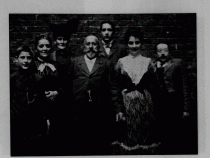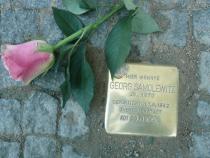Location
Levetzowstr. 16
District
Moabit
Stone was laid
June 2009
Born
01 July 1870 in Berlin
Occupation
Kaufmann / Stadtverordneter
Deportation
on 17 August 1942
to
Theresienstadt
Dead
30 August 1942 im Ghetto Theresienstadt
Georg Samolewitz was born on 1 July 1870 in Berlin, the second son of Moritz Samolewitz, a tradesman, and his wife Rahel. Their eldest son, Isidor, born in 1867, died when he was 23. Two children, born after Georg, died when still very young. Finally, in 1883, Georg’s brother Leopold was born.
Georg’s father Moritz (Moshe) Samolewitz (1840-1912) came from Gollub in West Prussia (today Golub-Dobrzyń, Poland), then close to the Russian border, and grew up in a religious Orthodox family. Following his father’s early death, the family fell on hard times and Moritz Samolewitz started working as an itinerant trader in East and West Prussia. In 1863 he married 16 year-old Rahel Hirschfeld (c. 1849-1928) from Thorn. The newly-weds moved from place to place, not staying anywhere for long, until they eventually settled in Berlin. A “tradesman” of the name M. Samolewitz, resident at Kloster Strasse 16, 3rd floor, is first listed in the Berlin directory just before the founding of the Reich in 1871. Moritz Samolewitz started out selling second- hand clothes and later specialized in shoes. From 1879 the family lived at Fehrbelliner Strasse 28, where Moritz Samolewitz opened a shoe shop which soon became a flourishing business. The family also retained its clothing sideline for some years.
Georg Samolewitz, who had developed a hump as a small child as a result of mishandled medical treatment, probably attended the Adass-Jisroel community school, like his brother Leopold. His father, an Orthodox Jew, had joined the community founded by Rabbi Hildesheimer. Georg Samolewitz received his commercial training in his father’s business, working first as a shopkeeper and later as the company secretary.
In 1889 Georg’s father bought the neighbouring building, Fehrbelliner Strasse 30. The Samolewitz family lived on the first floor of the house next-door to the shoe shop. Ten years later, the shoe shop was also relocated to no. 30.
In 1897, Georg Samolewitz married Rosalie Jacobis. Born on 16 July 1869 in Berlin, Rosalie came from a poor family and supported herself and her widowed mother by working in a lace shop. Georg Samolewitz now set up his own home, together with his wife and mother-in-law, on the first floor of the house at Fehrbelliner Strasse 30.
In 1905 Moritz Samolewitz evidently withdrew from the business and moved to another apartment with his wife and youngest son Leopold. Georg Samolewitz was henceforth entered in the Berlin directory as the owner of the shoe shop.
Like his father Moritz, Georg Samolewitz was a member of the Odd Fellows order in Berlin where, according to his brother Leopold, he attained a high position. In the years 1902-03 and 1912-13 he was grandmaster of the Immanuel Kant Lodge.
Georg Samolewitz was also politically active, serving as an SPD city councillor in 1919-20.
In the 1920s, inflation and economic crisis left their mark on Georg Samolewitz’s business. In 1922 he was forced to close down the shoe shop and, the following year, sell the house at Fehrbelliner Strasse 30. He then opened a shop specializing in jersey underwear, which he ran until 1927. Subsequently Georg Samolewitz was listed in the Berlin directory simply as a “tradesman”, resident from 1927 at Levetzow Strasse 16 in Moabit. His name was last entered in 1936. It is thought that, at the age of 66, Georg and his wife Rosalie retired to the Jewish old people’s home at Berkaer Strasse 33-35 in Berlin-Wilmersdorf.
It is from here that they were deported to Theresienstadt on 17 August 1942 in the “1st major old people’s transport” together with 1000 other Berlin Jews. Before they went, they were probably made to sign a “home purchase contract”, like all residents of old people’s homes, supposedly to cover the cost of their accommodation and food in the Theresienstadt ghetto. Georg Samolewitz died after nearly 2 weeks in the ghetto, on 30 August 1942. His wife Rosalie was deported to Treblinka death camp on 19 September 1942 and murdered.
Georg’s brother Leopold Samolewitz became a doctor of law and father to two sons. In 1939 he immigrated with his wife Else to Palestine, where his son Kurt lived. His younger son Hans-Werner had immigrated to England. After the war, Leopold represented clients in compensation proceedings. He died in Israel in 1959. He left his grandchildren records of his childhood and youth in Germany, which they later placed at the disposal of the Leo Baeck Institute in New York. In these records, Leopold Samolewitz describes his brother thus: “He was always cheerful and had a wonderful sense of humour. He liked to make fun of people but was never mean, always friendly.”
Georg’s father Moritz (Moshe) Samolewitz (1840-1912) came from Gollub in West Prussia (today Golub-Dobrzyń, Poland), then close to the Russian border, and grew up in a religious Orthodox family. Following his father’s early death, the family fell on hard times and Moritz Samolewitz started working as an itinerant trader in East and West Prussia. In 1863 he married 16 year-old Rahel Hirschfeld (c. 1849-1928) from Thorn. The newly-weds moved from place to place, not staying anywhere for long, until they eventually settled in Berlin. A “tradesman” of the name M. Samolewitz, resident at Kloster Strasse 16, 3rd floor, is first listed in the Berlin directory just before the founding of the Reich in 1871. Moritz Samolewitz started out selling second- hand clothes and later specialized in shoes. From 1879 the family lived at Fehrbelliner Strasse 28, where Moritz Samolewitz opened a shoe shop which soon became a flourishing business. The family also retained its clothing sideline for some years.
Georg Samolewitz, who had developed a hump as a small child as a result of mishandled medical treatment, probably attended the Adass-Jisroel community school, like his brother Leopold. His father, an Orthodox Jew, had joined the community founded by Rabbi Hildesheimer. Georg Samolewitz received his commercial training in his father’s business, working first as a shopkeeper and later as the company secretary.
In 1889 Georg’s father bought the neighbouring building, Fehrbelliner Strasse 30. The Samolewitz family lived on the first floor of the house next-door to the shoe shop. Ten years later, the shoe shop was also relocated to no. 30.
In 1897, Georg Samolewitz married Rosalie Jacobis. Born on 16 July 1869 in Berlin, Rosalie came from a poor family and supported herself and her widowed mother by working in a lace shop. Georg Samolewitz now set up his own home, together with his wife and mother-in-law, on the first floor of the house at Fehrbelliner Strasse 30.
In 1905 Moritz Samolewitz evidently withdrew from the business and moved to another apartment with his wife and youngest son Leopold. Georg Samolewitz was henceforth entered in the Berlin directory as the owner of the shoe shop.
Like his father Moritz, Georg Samolewitz was a member of the Odd Fellows order in Berlin where, according to his brother Leopold, he attained a high position. In the years 1902-03 and 1912-13 he was grandmaster of the Immanuel Kant Lodge.
Georg Samolewitz was also politically active, serving as an SPD city councillor in 1919-20.
In the 1920s, inflation and economic crisis left their mark on Georg Samolewitz’s business. In 1922 he was forced to close down the shoe shop and, the following year, sell the house at Fehrbelliner Strasse 30. He then opened a shop specializing in jersey underwear, which he ran until 1927. Subsequently Georg Samolewitz was listed in the Berlin directory simply as a “tradesman”, resident from 1927 at Levetzow Strasse 16 in Moabit. His name was last entered in 1936. It is thought that, at the age of 66, Georg and his wife Rosalie retired to the Jewish old people’s home at Berkaer Strasse 33-35 in Berlin-Wilmersdorf.
It is from here that they were deported to Theresienstadt on 17 August 1942 in the “1st major old people’s transport” together with 1000 other Berlin Jews. Before they went, they were probably made to sign a “home purchase contract”, like all residents of old people’s homes, supposedly to cover the cost of their accommodation and food in the Theresienstadt ghetto. Georg Samolewitz died after nearly 2 weeks in the ghetto, on 30 August 1942. His wife Rosalie was deported to Treblinka death camp on 19 September 1942 and murdered.
Georg’s brother Leopold Samolewitz became a doctor of law and father to two sons. In 1939 he immigrated with his wife Else to Palestine, where his son Kurt lived. His younger son Hans-Werner had immigrated to England. After the war, Leopold represented clients in compensation proceedings. He died in Israel in 1959. He left his grandchildren records of his childhood and youth in Germany, which they later placed at the disposal of the Leo Baeck Institute in New York. In these records, Leopold Samolewitz describes his brother thus: “He was always cheerful and had a wonderful sense of humour. He liked to make fun of people but was never mean, always friendly.”




